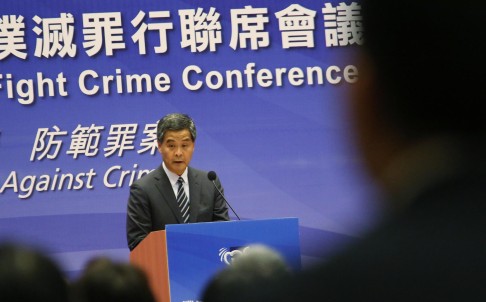Top officials warn of possible Muslim terrorist threats to city
Chief executive, police commissioner say city should not take Muslim extremist dangers lightly as leaflets with IS logo circulate
PUBLISHED : Sunday, 22 March, 2015, 5:07am
UPDATED : Sunday, 22 March, 2015, 5:07am
Lana Lam and Bryan Harris

Leung Chun-ying addresses the conference. Photo: Felix Wong
Two of Hong Kong's top officials have warned of the threat posed by international terrorism as Muslim groups in the city express concern over leaflets circulating which bear a logo associated with the extremist Islamic State.
Speaking at a conference on crime yesterday, Chief Executive Leung Chun-ying took the unusual step of highlighting recent attacks overseas, warning that Hong Kong - as an open, international city - should not take the threat of terrorism lightly.
His comments were echoed by Police Commissioner Andy Tsang Wai-hung and later police sources told the Sunday Morning Post they were "monitoring the situation closely'' after a leaflet bearing the an image associated with Islamic State was found to be circulating among Indonesian domestic helpers in the city.
Without prompting, Leung raised the issue of terrorism at the government's Fight Crime Conference yesterday.
"I have noticed that terrorist attacks and other terrorist activists have been spreading nationally and internationally recently. A terrorist attack hit Tunisia just this Wednesday," he said.
"There was also a report which said that some terrorists were recruiting members in Hong Kong.
"Hong Kong has been one of the safest cities in the world. However, it is also one of the most open, international cities with high respect of personal freedom and privacy.
"Against this background and seeing new terrorist threats, we should not take the matter lightly," the chief executive warned.
Taking questions from the media after the conference, Tsang said "so far'' there was no information suggesting that Hong Kong could become a target of a terrorist attack, and when asked about the appearance of the leaflets said: "Now we will handle that with care and appeal to members of the public, including our domestic helpers, to stay within the bound of the law."
Tsang added that police had stepped up anti-terrorism work in recent years, citing the establishment of a Counter Terrorism Response Unit and a Critical Infrastructure Security Coordination Centre. Cyberterrorism was an emerging issue to pay attention to, Tsang said.
The leaflets - obtained by the Post yesterday - advertise a talk this morning in the city on the errors of the Shiite branch of Islam.
Last week, Chinese-language media published images of a separate leaflet that appeared to encourage sympathy for Islamic State among Indonesian migrant workers in the city. However, doubts have been raised about the veracity of the latest leaflet; another leaflet for the same talk did not bear the Islamic State-associated logo.
Professor Yang Shu, an expert on Central Asia at Lanzhou University, said it has been an established fact those recruited for training would return to home their country to launch jihads, but there was no ground for Hong Kong to panic.
"This is a global issue, with thousands being recruited around the world, especially those from Europe," Yang said.
However, he said it was hard to assess when or what form of damage they would cost.
"Hong Kong does not need to worry too much as there is no built-up of hatred targeting the city by international Islamic extrem groups. Its political image is still positive," Yang said, adding that those who returned to launch a jihad in China would avoid a possible customs inspection by arriving in Hong Kong.
Islam has two main denominations: Sunnis and Shiites. Shiites believe that the descendants of Prophet Mohammad should lead Muslims, while Sunnis believe the leader of Islam should be appointed via consensus and election. The vast majority of the world's Muslim population - 85 per cent - are Sunni. Indonesia, the world's largest Muslim country, is predominantly Sunni. Islamic State - which has overrun swathes of Iraq and Syria - are Sunni extremists, which is why they worry Shiite Iran.
Additional reporting by Fanny Fung and Mimi Lau in Guangzhou
